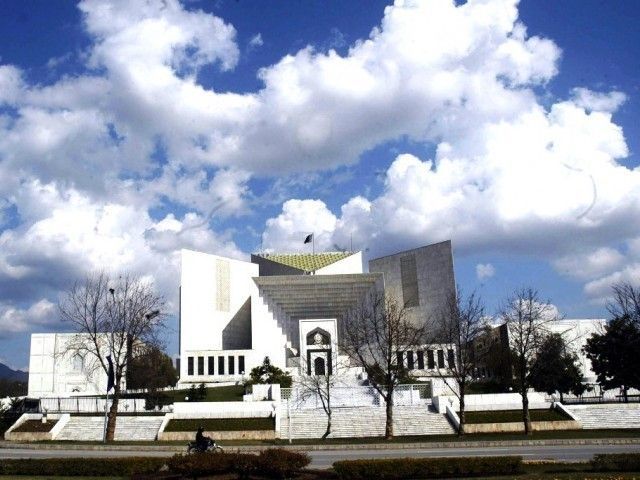
Since the restoration of judges in March 2009, the Supreme Court has been actively intervening in different elections processes.
During the tenure of former chief justice of Pakistan Iftikhar Chaudhry from March 2009 to 2013, the apex court closely examined the election process by conducting hearings in several cases.
Firstly, hearing PTI chief Imran Khan’s petition, the SC had ordered the Election Commission of Pakistan (ECP) to finalize voter lists until February 23, 2012 but the ECP could not meet the court’s deadline and the ECP officials had faced tough time in the apex court.
In view of the SC’s immense pressure, then ECP secretary Ishtiaq Ahmad Khan had written a letter to then prime minister Yousuf Raza Gilani over what he felt was undue interference by the Supreme Court in the affairs of the commission.
“Attempts by one institution to encroach upon the domains of other state institutions, in violation of clearly defined roles laid down in the Constitution, will only lead to disruption of the democratic system and chaos in society,” he had said in his letter and also offered his resignation. Later, the court had taken notice of the ECP secretary’s letter but it did not pass any coercive order against him.
The SC on March 14, 2012 directed the then Attorney General for Pakistan (AGP) to assist it in determining as to why the constitutional command under Article 219 of the Constitution was not met by the ECP and delayed the process of finalization of fresh electoral lists without seeking approval.
Confrontation between the ECP and the SC regarding the preparation of voter lists ended after the retirement of then chief election commissioner (CEC) Hamid Ali Mirza on March 23, 2012.
In June 2012, the court gave a verdict in the Workers Party case after hearing counsels of different political parties. The court in its judgment had recommended several steps to the ECP for ensuring free and fair elections. Later, the SC initiated proceedings to implement its ruling.
On Nov 26, 2012, the SC observed that constituencies in Karachi should be delimited in a way to reflect “mixed population” to avoid political polarization but the ECP was reluctant to comply with the order.
Read more: SC dismayed at ECP failure to curb Senate horse trading
MQM founder Altaf Hussain had termed the court’s order regarding fresh delimitation in Karachi before a census an attempt to “snatch the party’s mandate” and said people of the city would never allow any such “conspiracy” to succeed. The apex court had later issued contempt notice to the MQM former chief but he had tendered an unconditional apology, which was accepted.
The SC on March 1, 2013 assailed the ECP for not implementing the court’s orders on delimitation of Karachi constituencies. In view of the court’s pressure, the ECP on March 22 issued a notification for delimitation of some constituencies in Karachi.
According to the notification, three constituencies of the National Assembly and eight constituencies of the provincial assembly were subject to delimitation. The MQM had complained in the United Nations against the delimitation of constituencies in Karachi.
On December 4, 2012, the court – while hearing the plea of different political parties except the MQM – ordered the ECP to carry out a door-to-door verification process of electoral rolls in Karachi with the assistance of the Pakistan Army and the Frontier Constabulary (FC).
Before the 2013 general elections, the Supreme Court had focused on a matter related to granting voting rights to overseas Pakistanis in the upcoming general elections.
The ECP and the information technology ministry had asserted before the SC that giving rights to overseas Pakistanis would not be possible in the elections and anything done in haste would simply create unforeseen problems and seriously affect the credibility of the elections.
In July 2013, the Supreme Court had ordered the ECP to revise the presidential election schedule. Opposition parties had strongly protested over the SC decision. With the intervention of the Supreme Court, local government elections were held all over the country during the PML-N tenure.
After the emergence of the Panama Papers scandal in 2016, the PML-N had faced a tough time.
Following the SC’s decision to disqualify former prime minister Nawaz Sharif, the PML-N nominees had contested as independent candidates during previous Senate elections.
The Supreme Court led by former CJ Saqib Nisar had also stopped the ECP from issuing notification regarding the success of four newly elected senators due to their allegedly dual nationality.
Three of the newly elected senators belonged to the PML-N and one to the PTI.
The matter remained pending for several months. In October, 2018, when the PTI got majority in Punjab, the SC disqualified two PML-N senators Haroon Akhtar and Sadia Abbasi for holding dual citizenship. After their disqualification, the PTI was successful in getting both the seats.
Contrary to the Election Act 2017, the SC on June 5, 2018 restored almost all information omitted in the nomination forms by the parliament. One section of lawyers had questioned the SC order.
Before the 2018 election, former CJ Nisar had tried hard to give the overseas Pakistanis the right to vote. However it could not be done. “I tried that overseas Pakistanis could get facility to exercise their right to vote in the upcoming election but at this time, damage may occur at large scale for initiating any further step in this case,” the CJ had noted.
Last month, a two-judge bench of the apex court – comprising Justice Qazi Faez Isa and Justice Yahya Afridi – had summoned Chief Election Commissioner (CEC) and all ECP members for not holding the LG elections in the country.
A larger bench, led by CJ Gulzar Ahmed, once again summoned the same officials while hearing a presidential reference on Tuesday along with a proposal to curb corrupt practices in Senate elections.
The court expressed disappointment over the ECP’s inaction to comply with Article 218 (3). The bench summoned them today (Wednesday) with a new mechanism to curb corrupt practices in upcoming Senate elections.
After the 2013 general elections, Prime Minister Imran Khan had accused former CJP Iftikhar Chaudhry that he was involved in elections rigging. Due to involvement of judicial officers in the elections process, the PTI had termed 2013 elections as Returning Officers (ROs) election.

1725612926-0/Tribune-Pic-(8)1725612926-0-165x106.webp)















COMMENTS
Comments are moderated and generally will be posted if they are on-topic and not abusive.
For more information, please see our Comments FAQ